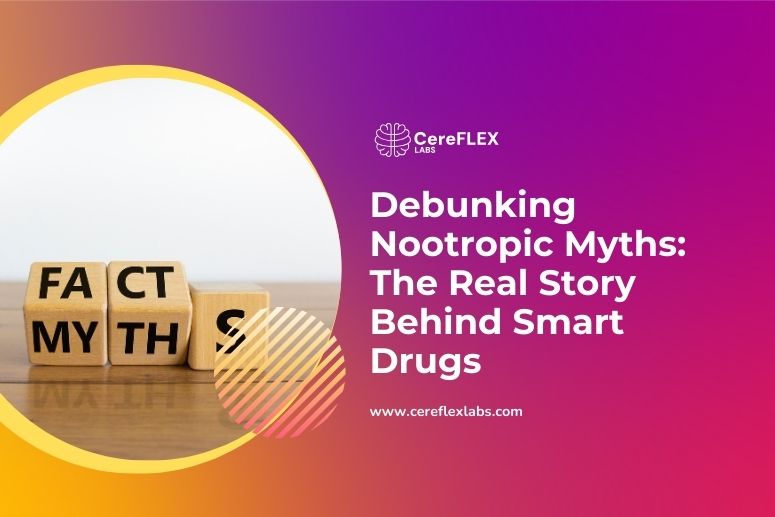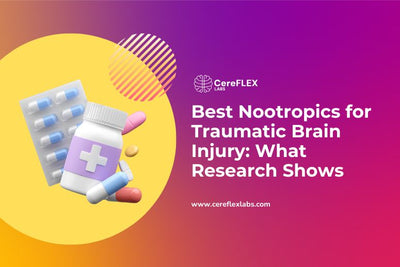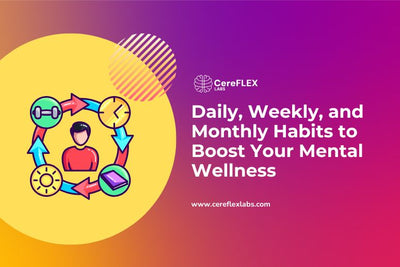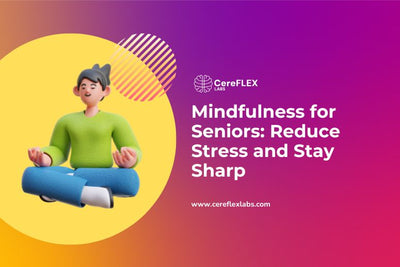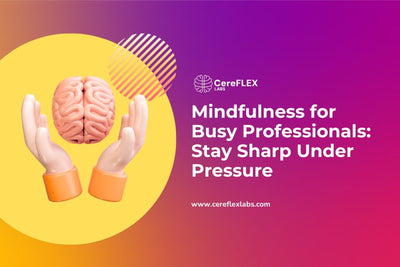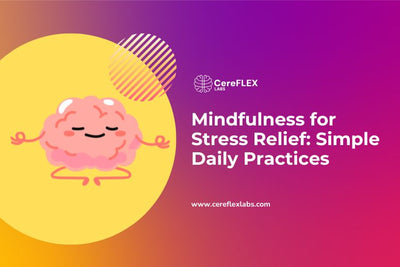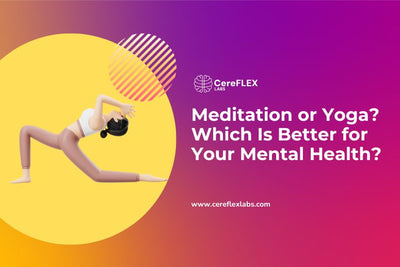Nootropics, often called "smart drugs," have gained immense popularity as people seek ways to boost focus, enhance memory, and improve cognitive performance. From students to professionals, many turn to these cognitive enhancers in hopes of achieving sharper thinking and increased productivity.
But how much of this is science-backed, and how much is just marketing hype?
The supplement industry is known for making bold claims, and nootropics are no exception. Many products promise instant intelligence boosts and risk-free benefits, but not all of these claims hold up under scrutiny. In reality, not all nootropics work the same way, and their effectiveness varies based on scientific research, formulation, and individual response.
Before getting caught up in the hype, it's essential to separate fact from fiction. Are nootropics truly a brain-boosting breakthrough, or just another overhyped marketing gimmick? Let’s uncover the truth behind nootropic myths and see what science really says.
What are nootropics?
Nootropics, also called "smart drugs" or cognitive enhancers, are substances designed to boost mental performance, including memory, focus, and creativity. The nootropic market is diverse, offering products ranging from prescription medications to herbal supplements. However, it’s crucial to distinguish between natural and synthetic nootropics to understand their benefits and risks.
Natural vs. Synthetic Nootropics
Natural nootropics, also known as natural cognitive enhancers, are compounds derived from plants and herbs and are often sold as dietary supplements. While some have mild cognitive benefits, their effectiveness varies from person to person.

Common Natural Nootropics:
- Caffeine – Found in coffee and tea, it enhances alertness and reaction time.
- L-Theanine – Present in green tea, it promotes relaxation without drowsiness and pairs well with caffeine for improved focus.
- Bacopa Monnieri – Used in Ayurveda, it supports memory retention and stress reduction.
- Rhodiola Rosea – An adaptogen that may combat mental fatigue and enhance cognitive function under stress.
- Ginkgo Biloba – Thought to support memory and cerebral blood flow, though research findings are mixed.
In contrast, synthetic nootropics are lab-created compounds that can have stronger cognitive effects, with some requiring a prescription while others are available as supplements.

Common Synthetic Nootropics:
- Racetams (e.g., Piracetam, Aniracetam, Oxiracetam) – A class of compounds that may enhance memory and brain function, though research is ongoing.
- Modafinil (Prescription Only) – Originally developed for narcolepsy, it’s often used off-label to boost wakefulness and focus.
- Noopept – A synthetic peptide that enhances memory and learning similar to racetams but at a lower dose.
- Phenylpiracetam – A potent derivative of Piracetam that may improve cognitive function and physical endurance.
What are the common myths about nootropics?
As the demand for cognitive enhancers grows, so do misleading claims about their safety and effectiveness. Many nootropic supplements are marketed as instant "brain boosters", promising immediate intelligence gains with no risks. However, the reality is more complex.
Let’s separate fact from fiction by debunking some of the most common myths about nootropics.
#1 Myth: Nootropics Are Completely Safe and Have No Side Effects
Many believe that nootropics are entirely safe simply because they are often derived from natural sources. Marketing claims frequently suggest that these cognitive enhancers can be used by anyone without risk. However, the truth is more nuanced.
Fact: Nootropics Can Have Side Effects
Like caffeine, alcohol, or prescription drugs, nootropics alter brain chemistry, meaning they can cause side effects, especially when misused or taken in high doses.
Common side effects include headaches, stomach discomfort, sleep disturbances, and increased anxiety
The severity of these effects depends on the type of nootropic, dosage, and individual response. Nootropics are available in various forms, including capsules, tablets, and nootropics powder, allowing for flexible dosing.
#2 Myth: Nootropics are addictive
Many skeptics worry that nootropics can lead to addiction, especially since some synthetic cognitive enhancers alter brain chemistry in ways that could cause dependency. However, this concern often overlooks the key differences between various types of nootropics.
Fact: Natural nootropics are generally safe
Not all nootropics carry the same level of risk. Some synthetic options, such as prescription stimulants like Adderall or Modafinil, have habit-forming properties. In contrast, most natural nootropics do not cause dependency when used responsibly.
However, misuse or over-reliance on nootropics—even non-addictive ones—can lead to behavioral dependence, where individuals feel they cannot function without them.

How to Use Nootropics Responsibly
Using nootropics responsibly is key to avoiding dependency. Sticking to recommended dosages and incorporating breaks—such as only using nootropics on workdays—can help prevent reliance.
Additionally, not all nootropics work the same for everyone. Factors such as lifestyle, diet, and genetics play a role in how they affect individuals.
Another critical consideration is product quality. Choosing nootropic supplements from reputable brands ensures safety and efficacy. Products backed by scientific research, clinical trials, and third-party testing are more reliable than those with vague claims.
Ensuring the manufacturer follows Health Canada/FDA guidelines or other regulatory standards adds another layer of safety.
#3 Myth: Nootropics are a "Magic Pill" for instant cognitive enhancement
Many people believe that nootropics are miracle drugs capable of turning anyone into a genius overnight. Marketing hype often suggests that a single pill can unlock full brain potential, accelerate learning, and boost intelligence instantly. However, science does not support these claims.
Fact: Nootropics can enhance cognitive function, but don’t replace mental effort
While nootropics can enhance focus, memory, and mental clarity, their effects are gradual, not instantaneous. They work by modulating neurotransmitters, improving blood flow to the brain, and supporting neural plasticity over time.
However, no supplement can replace the fundamentals of cognitive development. Intelligence and mental sharpness come from learning, experience, and consistent effort, not from a quick-fix pill.
The Reality of Cognitive Enhancement
For lasting cognitive improvement, nootropics should be paired with healthy lifestyle habits, including:
✔ Proper sleep – Essential for memory retention and brain function.
✔ Balanced nutrition – A diet rich in omega-3s, antioxidants, and essential vitamins supports brain health.
✔ Regular exercise – Boosts blood flow to the brain, enhancing mental clarity.
✔ Mental stimulation – Activities like reading, problem-solving, and learning new skills strengthen neural connections.
#4 Myth: All nootropics are the same
A common misconception is that all nootropics work the same way and provide identical benefits. However, this belief overlooks the significant differences among various types of nootropics.
These substances range from natural compounds found in foods and herbs to synthetic cognitive enhancers, each with distinct effects on brain chemistry, neurotransmitters, and cognitive function.
Fact: Nootropics differ in composition, function, and effectiveness
Nootropics are not one-size-fits-all. Some provide mild cognitive support, while others have stronger, targeted effects on memory, focus, and mental clarity. Their effectiveness depends on their type, mechanism of action, and individual response.
Caffeine, for example, is one of the most commonly used nootropics. It works by blocking adenosine receptors, leading to increased alertness and improved concentration.
Synthetic nootropics like racetams, on the other hand, may enhance cognitive function by influencing neurotransmitter activity and promoting neuroplasticity.
And adaptogens such as Rhodiola Rosea help the body manage stress and maintain cognitive balance by regulating the body’s stress response.
Because nootropics function in different ways, there is no universal solution that works for everyone. A supplement that significantly enhances cognitive performance for one person might have little to no effect on another.
The best approach to using nootropics effectively is to research how they work, understand their potential benefits and risks, and determine which ones align with your cognitive needs and lifestyle.
#5 Myth: Nootropics can replace therapy
Some believe that nootropics alone can resolve mental health issues and trauma, eliminating the need for therapy. While certain nootropics may help reduce stress, anxiety, or depressive symptoms, they are not a standalone solution for emotional healing or long-term mental well-being.

Fact: Nootropics do not replace therapy
Nootropics can play a supportive role in managing mental health, but they cannot replace professional therapy, mindfulness practices, or a strong support system.
For example, L-Theanine, a popular natural nootropic, is known for its calming effects and can help alleviate anxiety. However, in cases of deep emotional distress, such as recovering from an abusive relationship, nootropic use alone is insufficient. It is therapy, mindfulness, and support from loved ones that truly facilitate healing.
While nootropics can aid brain function and emotional regulation, they should be viewed as a complementary tool, not a replacement for therapy or professional mental health care. Addressing underlying causes through therapy, emotional work, and lifestyle changes remains essential for long-term well-being.
The Truth About Nootropic Regulation in Canada
Understanding nootropic regulations in Canada requires knowing how Health Canada classifies and oversees these substances. Nootropics fall into different regulatory categories, depending on their ingredients and effects.
Many nootropics are classified as Natural Health Products (NHPs) and are regulated by the Natural and Non-prescription Health Products Directorate (NNHPD). To be legally sold in Canada, NHPs must have a product license, which is indicated by a Natural Product Number (NPN) on the label. This ensures that Health Canada has reviewed the product’s safety, quality, and health claims.
However, some nootropics with stronger effects fall under prescription drug regulations. These require a doctor’s prescription and are subject to stricter oversight. Medications used for ADHD or narcolepsy, such as Modafinil, fall into this category due to their potent cognitive-enhancing properties.
Health Canada’s Role in Nootropic Regulation
Health Canada actively monitors the market to ensure that products are accurately labeled and that any health claims are supported by evidence. They work to prevent false advertising, improve oversight of Natural Health Products, and enhance product labeling to protect public health.
Key Considerations When Buying Nootropics in Canada
Since nootropics encompass a broad range of substances, from vitamins and herbal extracts to synthetic compounds, regulation can be complex. Consumers should be cautious when purchasing nootropics, particularly online. Checking for an NPN on the label and buying from trusted sources helps ensure product legitimacy.
Before adding any nootropic to your routine, consult a healthcare professional to assess its suitability—especially if you have existing health conditions or take medications. A professional can also provide a comprehensive brain health assessment to determine which nootropics may benefit you the most.
How to Make an Informed Decision on Nootropic Use
Choosing the right nootropic supplement requires careful consideration of transparency, scientific backing, and personal health needs. With the growing market of cognitive enhancers, it's essential to distinguish between science-backed products and marketing hype to ensure both safety and effectiveness.
Selecting Science-Backed, Transparent Brands
Not all nootropics are created equal. Some companies prioritize marketing over research, making exaggerated claims without substantial scientific support. To identify high-quality products, look for brands that:
✔ Use clinically backed formulations – The best nootropics are supported by peer-reviewed studies, not just vague "scientifically proven" claims.
✔ Disclose all ingredients and dosages – Avoid products with proprietary blends that fail to list exact ingredient amounts. Clear labeling ensures you know what you're consuming.
✔ Follow strict manufacturing standards – Look for GMP (Good Manufacturing Practices) certification or Health Canada NPN (Natural Product Number) approval to confirm quality and regulatory compliance.
The Importance of Third-Party Testing
Since regulations on dietary supplements can be inconsistent, third-party testing helps verify purity, potency, and safety. Reputable nootropic brands submit their products for independent analysis, ensuring they contain what they claim.
Certifications from organizations like NSF, USP, or Informed-Choice indicate that a product meets high manufacturing standards. Companies that refuse to share lab reports or sourcing details may lack transparency, making them less trustworthy.
Supporting Cognitive Function with Healthy Habits
No nootropic can substitute for the fundamentals of brain health. For optimal cognitive performance, pair nootropic use with:
✔ Quality sleep – Essential for memory, focus, and mental clarity. No supplement can compensate for chronic sleep deprivation.
✔ Balanced nutrition – A diet rich in omega-3s, antioxidants, and essential vitamins supports brain function.
✔ Regular exercise – Physical activity improves blood circulation to the brain, enhancing cognitive performance.
✔ Effective stress management – Chronic stress damages cognitive function. Practices like mindfulness, meditation, and relaxation techniques help maintain mental clarity.
By combining science-backed nootropics with a brain-healthy lifestyle, you can make the most of cognitive enhancers while supporting long-term mental performance.
Conclusion
Nootropics can enhance brain function, focus, and memory, but not all products are effective. With misleading advertisements and weak regulations, it can be difficult to separate science-backed supplements from marketing hype.
To make informed choices, remember:
- Not all nootropics are the same – Their ingredients, effects, and safety profiles vary significantly.
- There’s no "magic pill" for intelligence – True cognitive improvement requires quality sleep, proper nutrition, and mental exercises alongside supplements.
- Research matters – Choose brands that disclose ingredients, provide clinical evidence, and follow regulatory standards.
At CereFlex Labs, we prioritize honesty, scientific integrity, and high-quality formulations to deliver genuine cognitive benefits. By selecting well-researched supplements and maintaining a balanced lifestyle, you can boost your mental performance safely and effectively.
